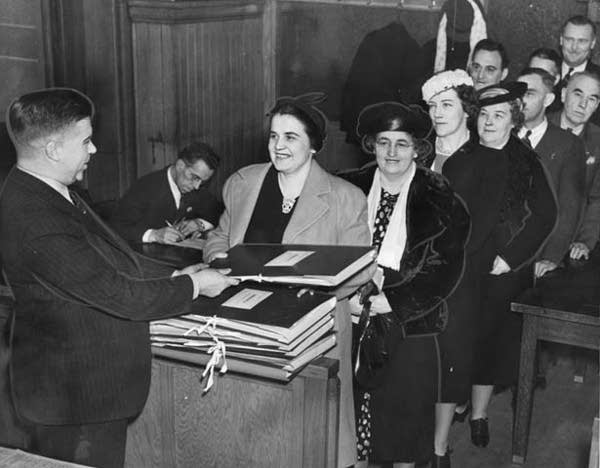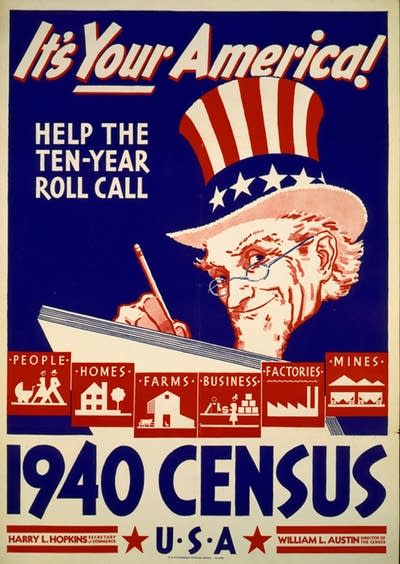1940 Census a bonanza for Minn. family history diggers
Go Deeper.
Create an account or log in to save stories.
Like this?
Thanks for liking this story! We have added it to a list of your favorite stories.

Paula Stuart-Warren says her family includes a John Dillinger get-away driver, a counterfeiter and a pioneering heart transplant surgeon.
Most families contain a similar range of characters once you start looking, the professional genealogist from Eden Prairie said.
Is that true in your family? On Monday morning, members of the public will have access to information that could help them piece together their family's history. At 8 a.m., the federal government will unseal individual records from the 1940 U.S. Census — 72 years after they were made.
"I'm going to find out if my grandfather was living in this country; I'm going to find out which of his brothers was in prison," Stuart-Warren said. "I'm going to be looking for my father-in-law because we can't find him or his family anywhere in 1930 census — even under any of their aliases."
Turn Up Your Support
MPR News helps you turn down the noise and build shared understanding. Turn up your support for this public resource and keep trusted journalism accessible to all.
Professional genealogists like Stuart-Warren and and her amateur counterparts are anxiously awaiting Monday's once-every-10-year data dump. If you know where your relatives lived, you can find out who lived there, where they were born, where they worked and even how much money they made.
But the records that come out Monday won't be indexed, which means you can't plug a relative's name into a search engine to find the data. You have to know the address and find the enumeration district — that's how census-takers carved up America's cities and countryside into smaller slices to count everyone.
"There's always the relative that no one wants to talk about."
Stuart-Warren has signed on as part of a massive volunteer effort to index all the names so the census will become searchable in the next six to 10 months.
In the meantime, you can find the whole census online at The National Archives and brick and mortar libraries like the Minnesota History Center will be busy too.
Old city directories, newspapers on microfilm and death certificates to help locate and flesh out family stories.
The Minnesota Historical Society Library's acting head of reference, Tracey Baker, said half the library's visitors come in search of family history.
"Maybe there was a missing brother no one talked about. Or perhaps grandma married before she married grandpa," Baker said. "There's always the relative that no one wants to talk about and people are solving those mysteries and coming to terms with true story and other people just want to know more about someone they didn't really get to know. There's an endless fascination."
A COUNTRY IN TRANSITION
The 1940 census is a snapshot of America still suffering from the Great Depression and not yet involved in World War II. It also asked people where they were in 1935, which Baker said can help trace the trajectory of what happened to a family during the Depression.
"In my family — and I grew up in North Dakota — they basically lost the farm. So they would have been on the farm in 1935 and they would have been in town in 1940," Baker said. "Many people had to move for work or for better economic circumstances or to live with someone else."
You can see if your family members were part of the Works Progress Administration or the Civilian Conservation Corps. Ten percent of Minnesota's population was doing this kind of public emergency work in 1940.
For those who hit a brick wall, the History Center has a genealogy help desk staffed by volunteers. Volunteer Tim Rice says he anticipates a lot of interest in the 1940 census. After all, nearly one in six people counted in the 1940 census was also counted in 2010.
"Many more people have parents or grandparents that are in the 1940 census than ones going further back," Rice said. "Every time you go back another 10 years, less of the population can relate to it as personally as the 1940 census."
Katy Herman, who was recently at the Minnesota History Center working on some earlier periods of her family's history, said she's curious to check out the 1940 census too.
"You know, 1940 is pretty well documented in my family, but it's still fun to see your names, the names of family members pop up," she said.
The History Center Library is closed on Mondays, but will reopen Tuesday, ready for the throngs of eager family history diggers.





